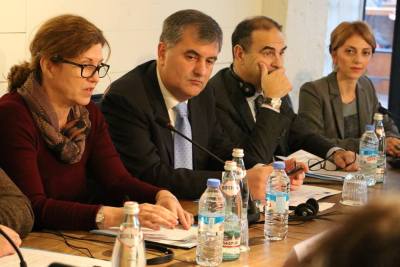The Ministry of Internally Displaced Persons from the Occupied Territories, Accommodation and Refugees of Georgia presents its Gender Equality Strategy and Action Plan
Date:
The promotion and observance of gender equality and the prevention and elimination of discrimination and sexual harassment are some of the key principles of the Gender Equality Strategy and Action Plan (GES) for 2016-2017 (AP) recently adopted by the Ministry of Internally Displaced Persons from the Occupied Territories, Accommodation and Refugees of Georgia (MRA).

The Ministry of Internally Displaced Persons from the Occupied Territories, Acoommodation and Refugees of Georgia presents its Gender Equality Strategy and Action Plan; Photo: MRA
The Ministry presented the GES and AP to civil society and development partners on 8 November 2016. The presentation was attended by the Minister and the First Deputy Minister of the MRA, the Assistant to the Prime Minister in Human Rights and Gender Equality Issues, the Deputy Public Defender of Georgia, and representatives from other ministries, the IDP community, civil society organizations and development partners.
Being one of the first line ministries in Georgia to officially adopt a GES and AP, the MRA has set ambitious goals and targets in order to, among others, support the Government’s efforts in combating violence against women and domestic violence, protecting victims/survivors, and implementing the UN Security Council resolutions on Women, Peace and Security, along with commitments stipulated in the respective National Action Plans of the Government of Georgia.
To successfully achieve these objectives, the MRA has created an internal gender equality mechanism by appointing a Gender Advisor to the Minister, establishing a Gender Equality Commission, and appointing gender focal points in the MRA’s regional branches. GES and AP foresee gender mainstreaming in the MRA’s internal policies and structures as well as programmes for Ministry’s beneficiaries, internally displaced persons, refugees, emigrants and other vulnerable groups of population.
“The goal of the GES is to support effective gender equality within the Ministry, but also take it further and to ensure effective equality between the beneficiaries of the Ministry”- said the Minister Sozar Subari.
Carlo Natale, Chargé d Affaires a.i. of the Delegation of the European Union to Georgia drew linkages with the 2016-2020 EU Gender Action Plan (GAP) adopted in October last year and stressed that “A vital element and a key message of this Gender Action Plan is the very strong emphasis on the institutional cultural shift, such as ensuring dedicated leadership on gender equality, more policy coherence and mainstreaming, closer coordination and dialogue with our partners at all levels and a more efficient monitoring and evaluation”. In this regard he commended the Government of Georgia and MRA to continue paving the way towards this critical institutional cultural shift.
UN Women Country Representative to Georgia, Erika Kvapilova, positively acknowledged the institutional mechanisms on gender equality established within the MRA and led by the Deputy Minister. She stressed the importance of this accountability mechanism expected to ensure effective overseeing of GES implementation.
Sopo Japharidze, Assistant to the Prime Minister in Human Rights and Gender Equality Issues congratulated the Ministry with this important step towards achievement of gender equality. She underlined satisfaction with the fact that Ministry’s Gender Equality Strategy and Action Plan are harmonized with other national policies on gender equality and women’s empowerment. She appreciated that the AP is budgeted, ensuring thus more effective implementation of MRA commitments.
The Gender Equality Strategy and Action Plan of the MRA has been developed in the framework of the EU-funded project “Gender sensitive socio-economic empowerment of vulnerable IDPs”, implemented by UN Women and the Food and Agriculture Organization of the United Nations (FAO). The project supports the most vulnerable IDPs in accessing and improving their livelihoods. A main objective is to mainstream gender equality into the MRA livelihood policy documents, manuals, procedures and guidelines addressing the social and economic needs of IDPs.
The project is funded by the European Union as part of the IDP IV programme, which aims to support the socio-economic integration of IDPs and their host communities.